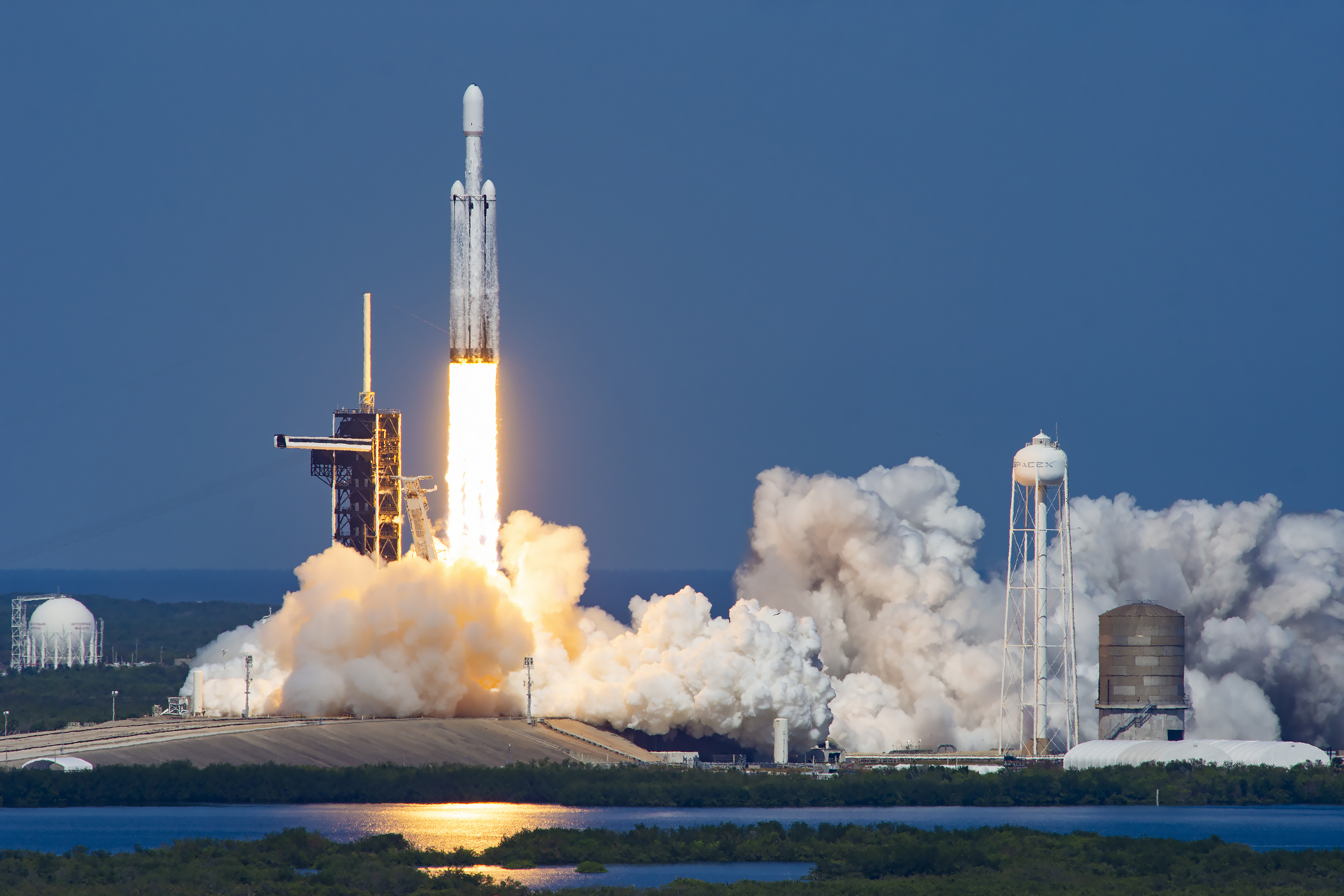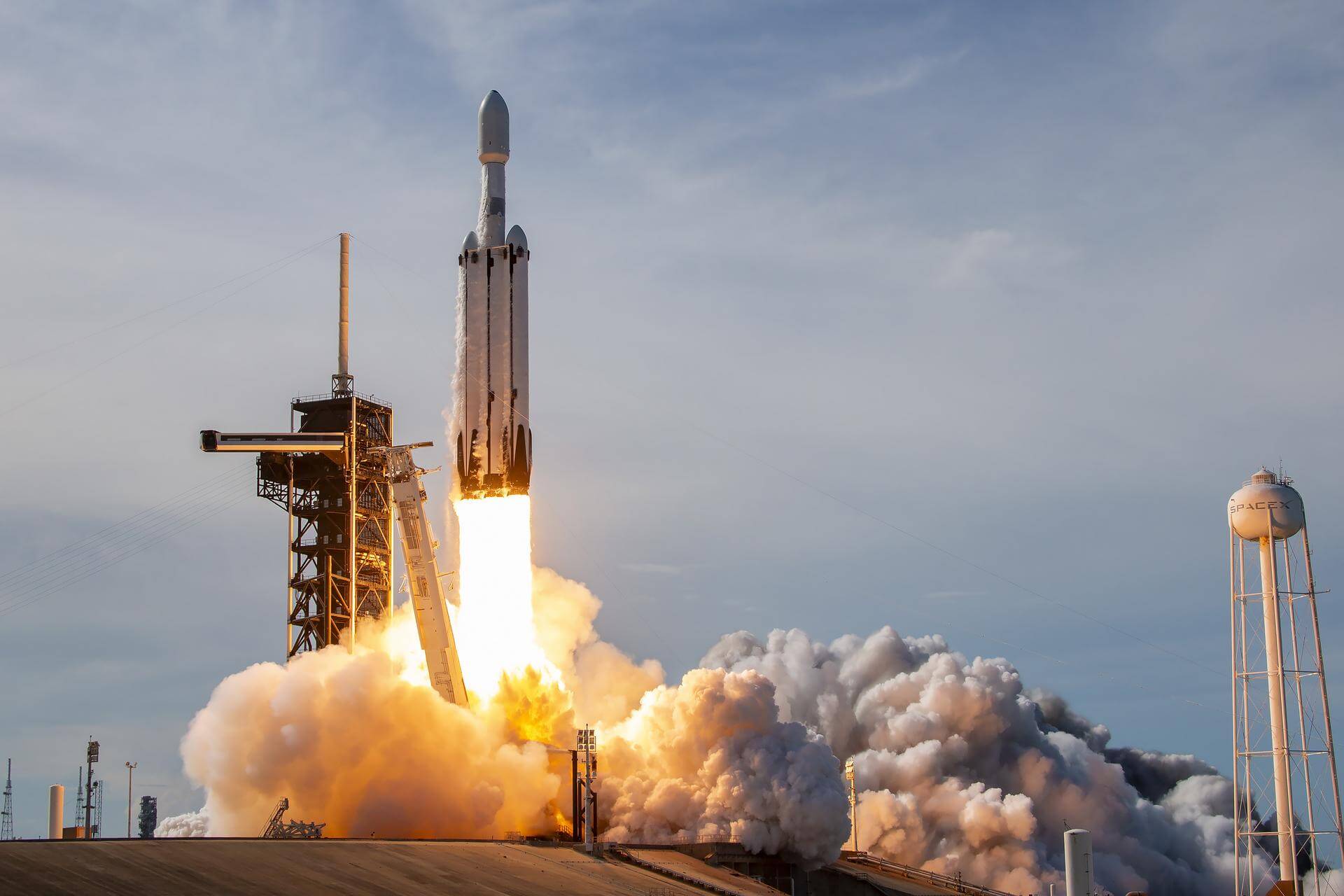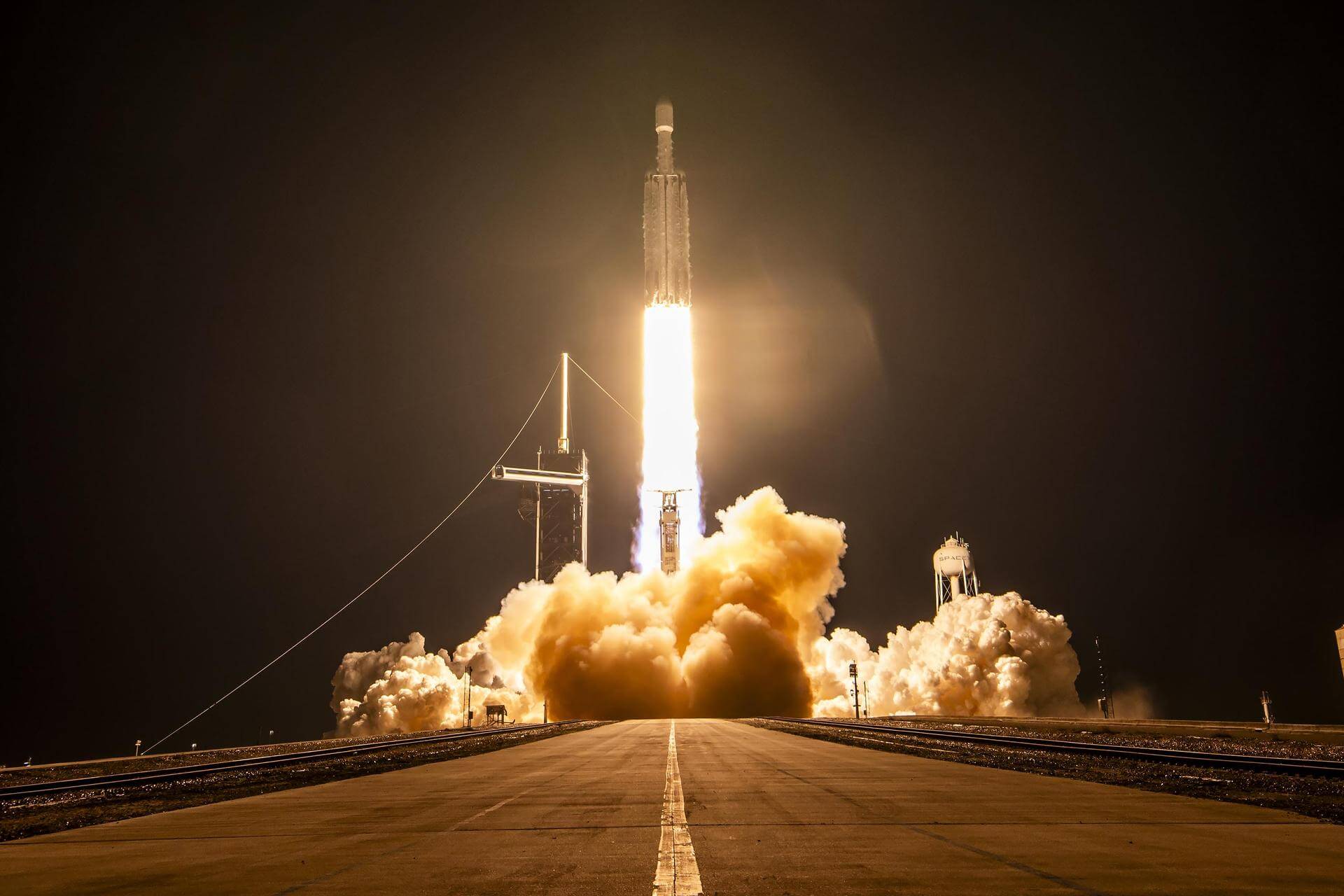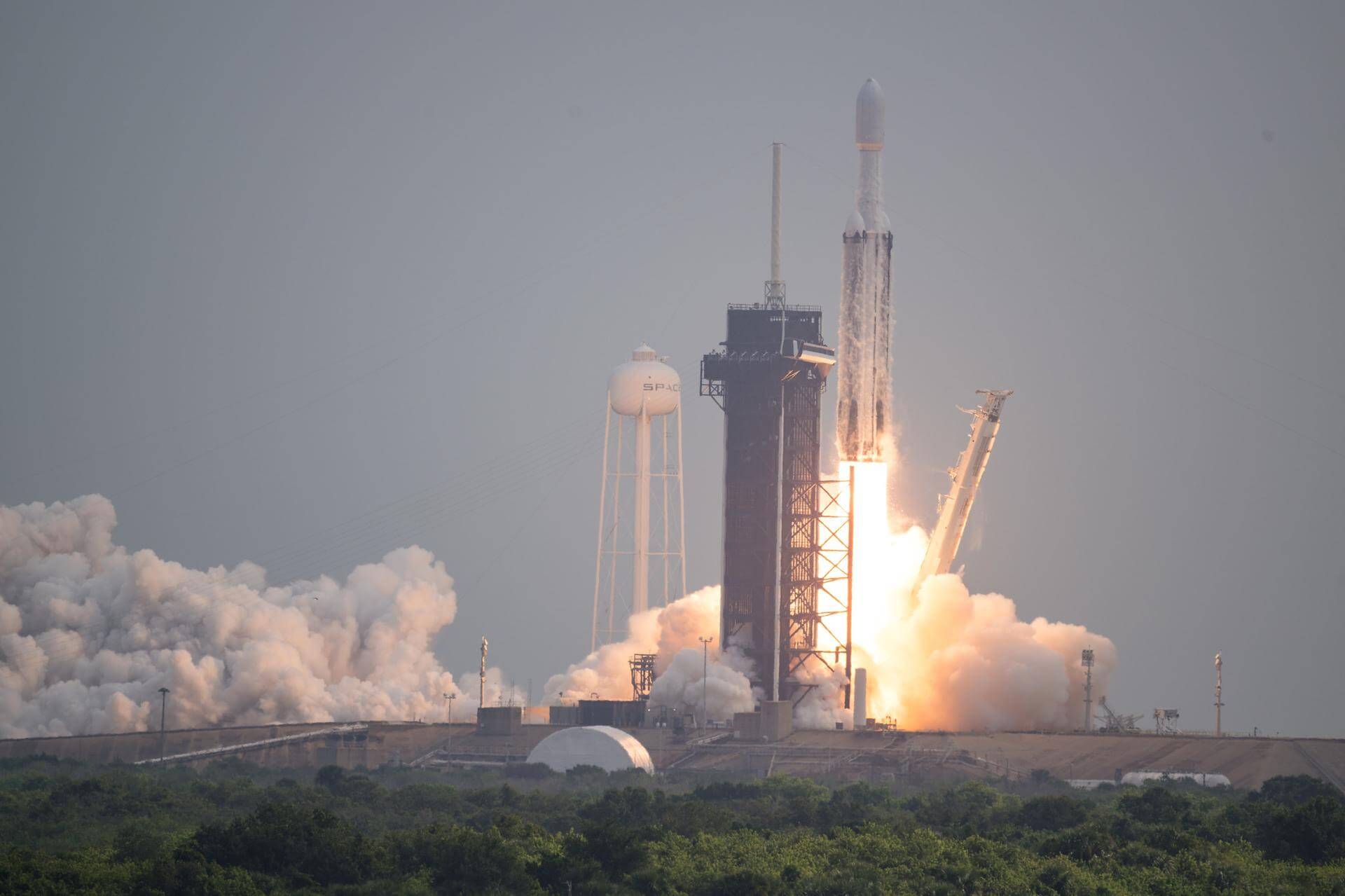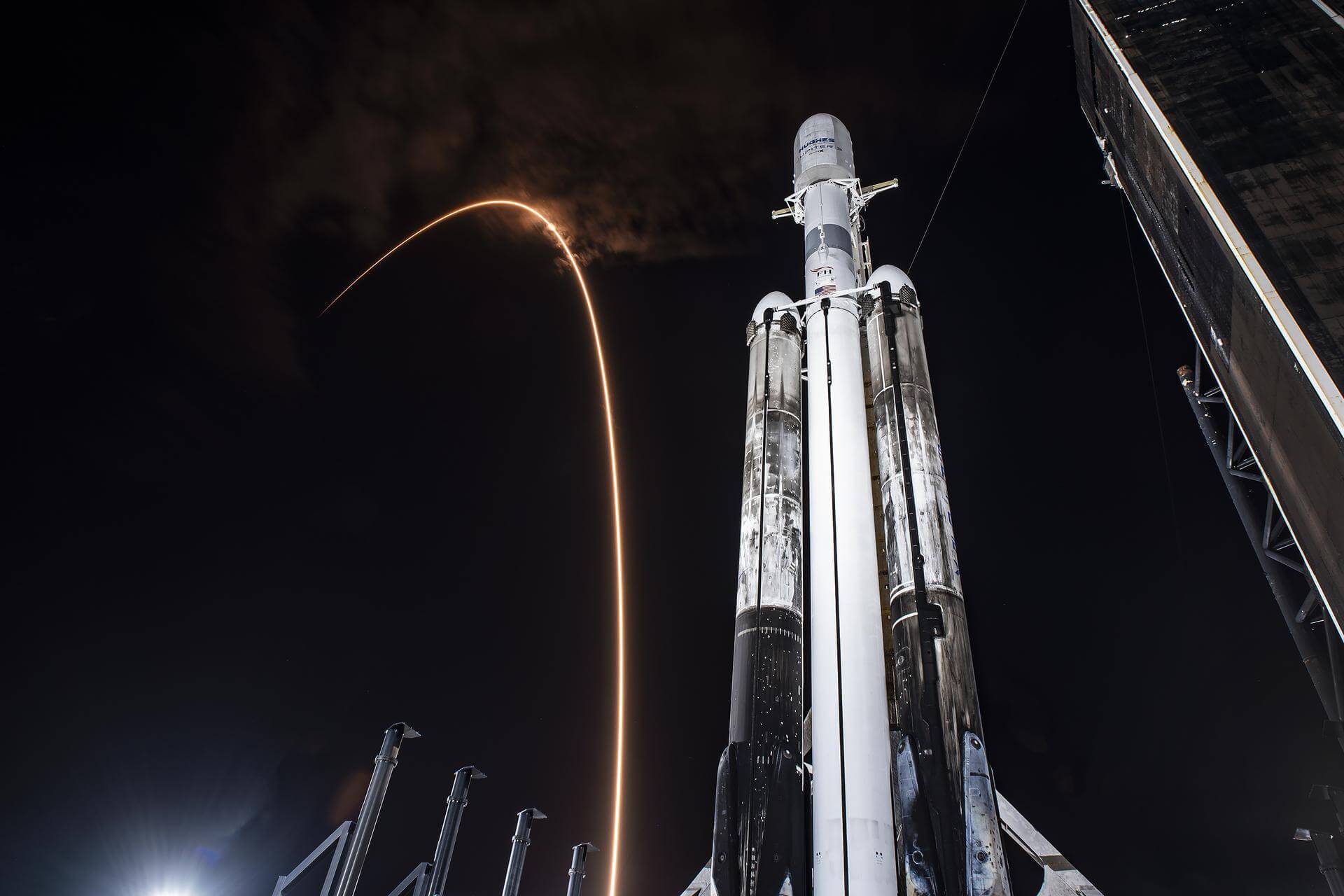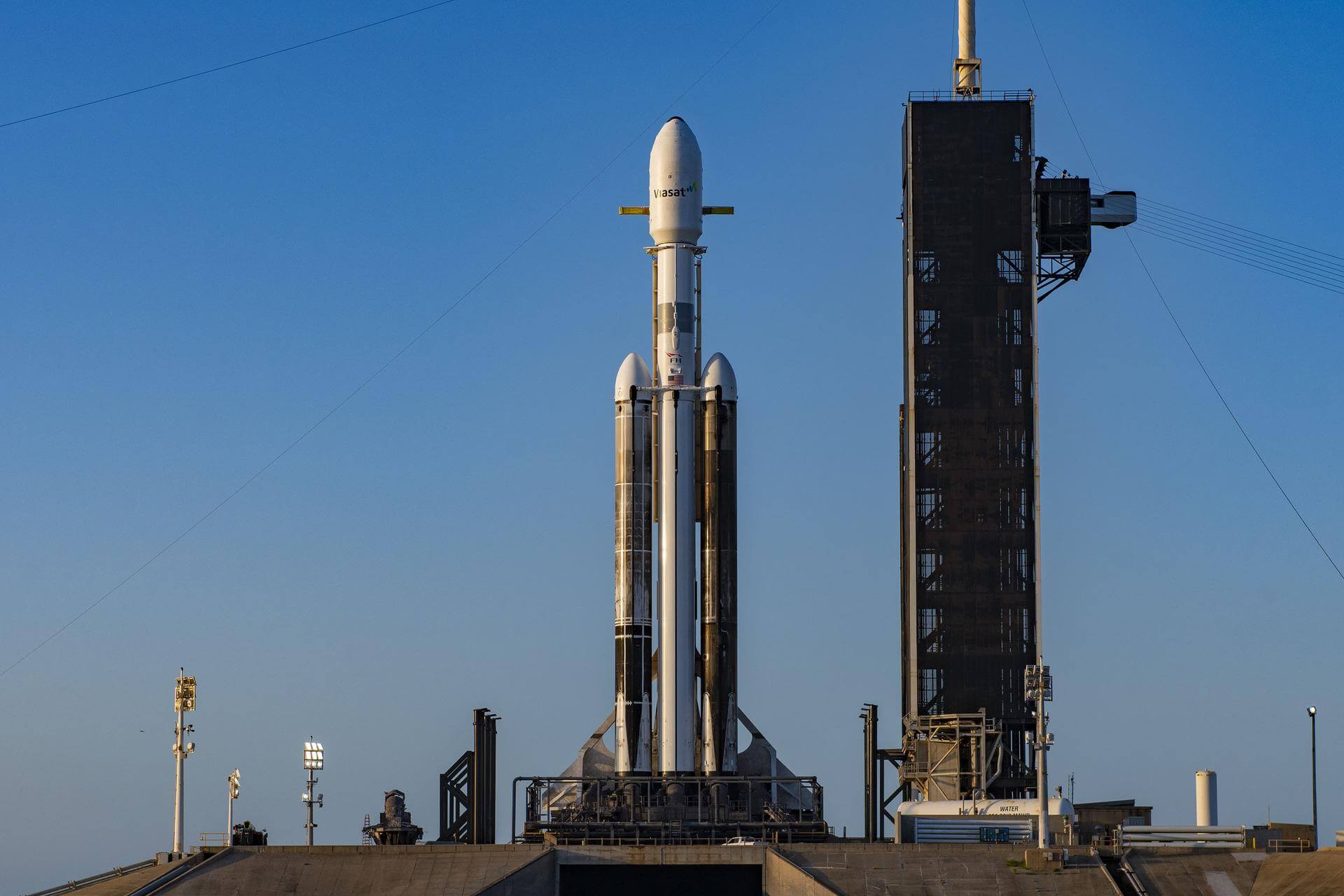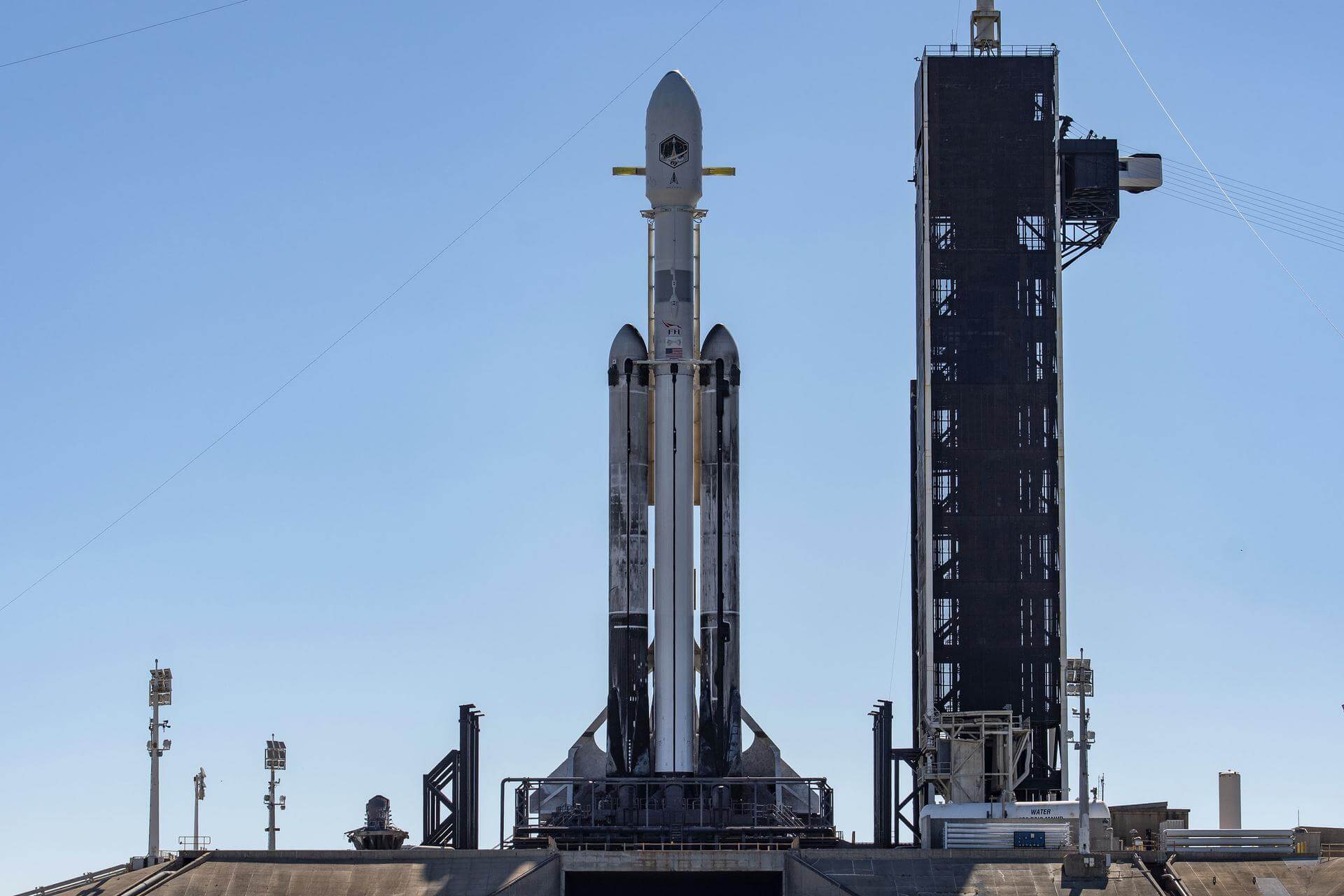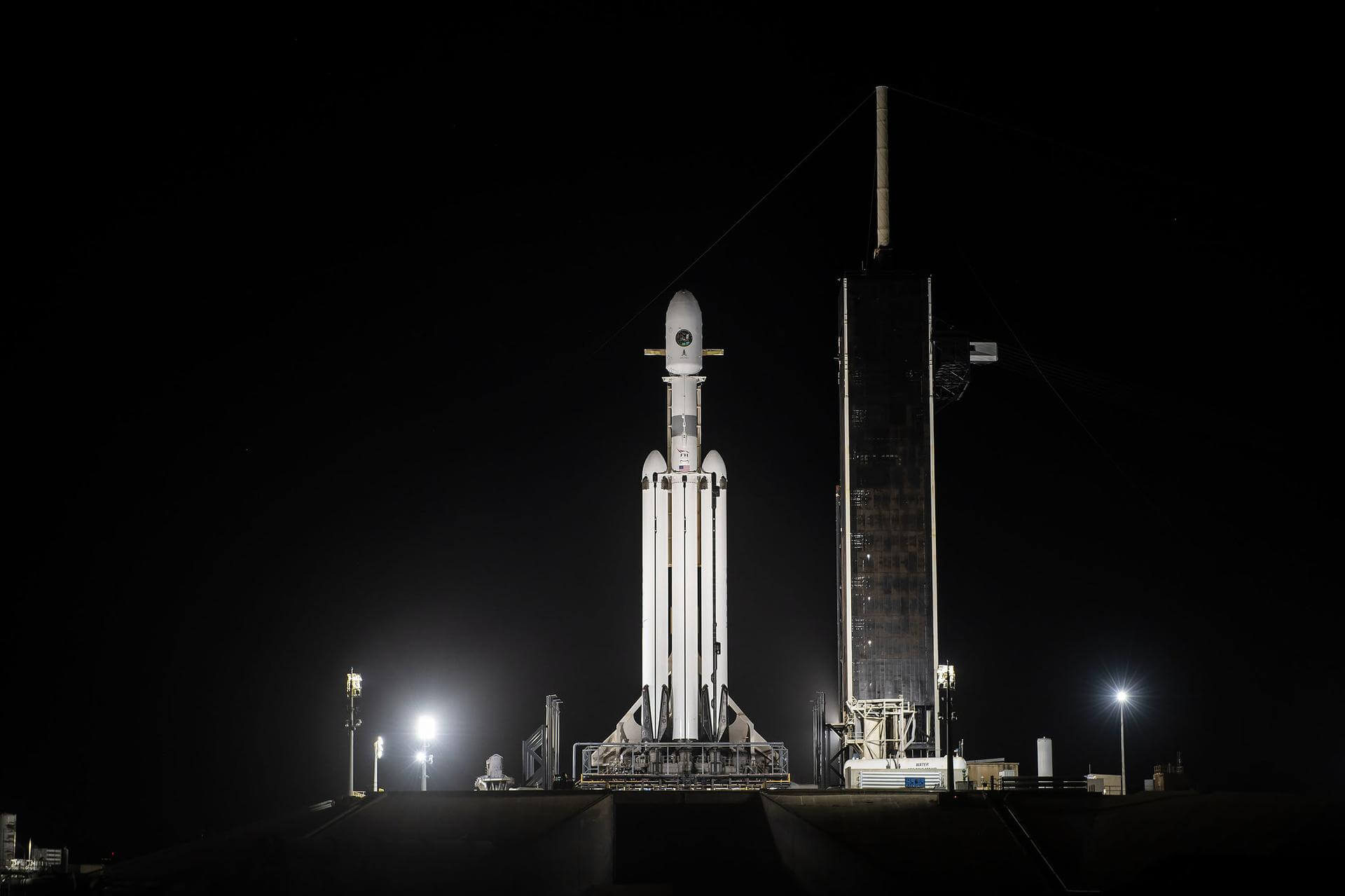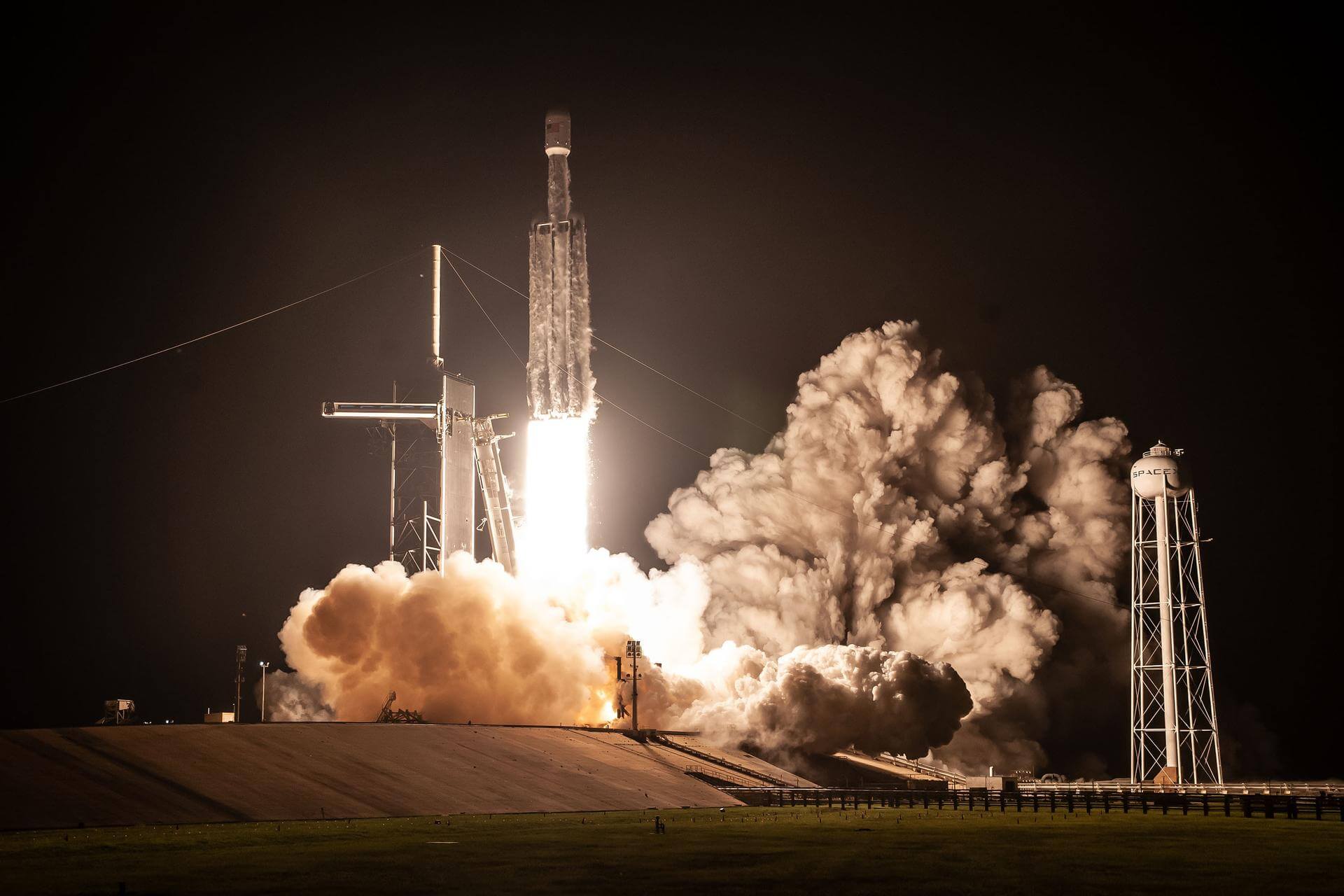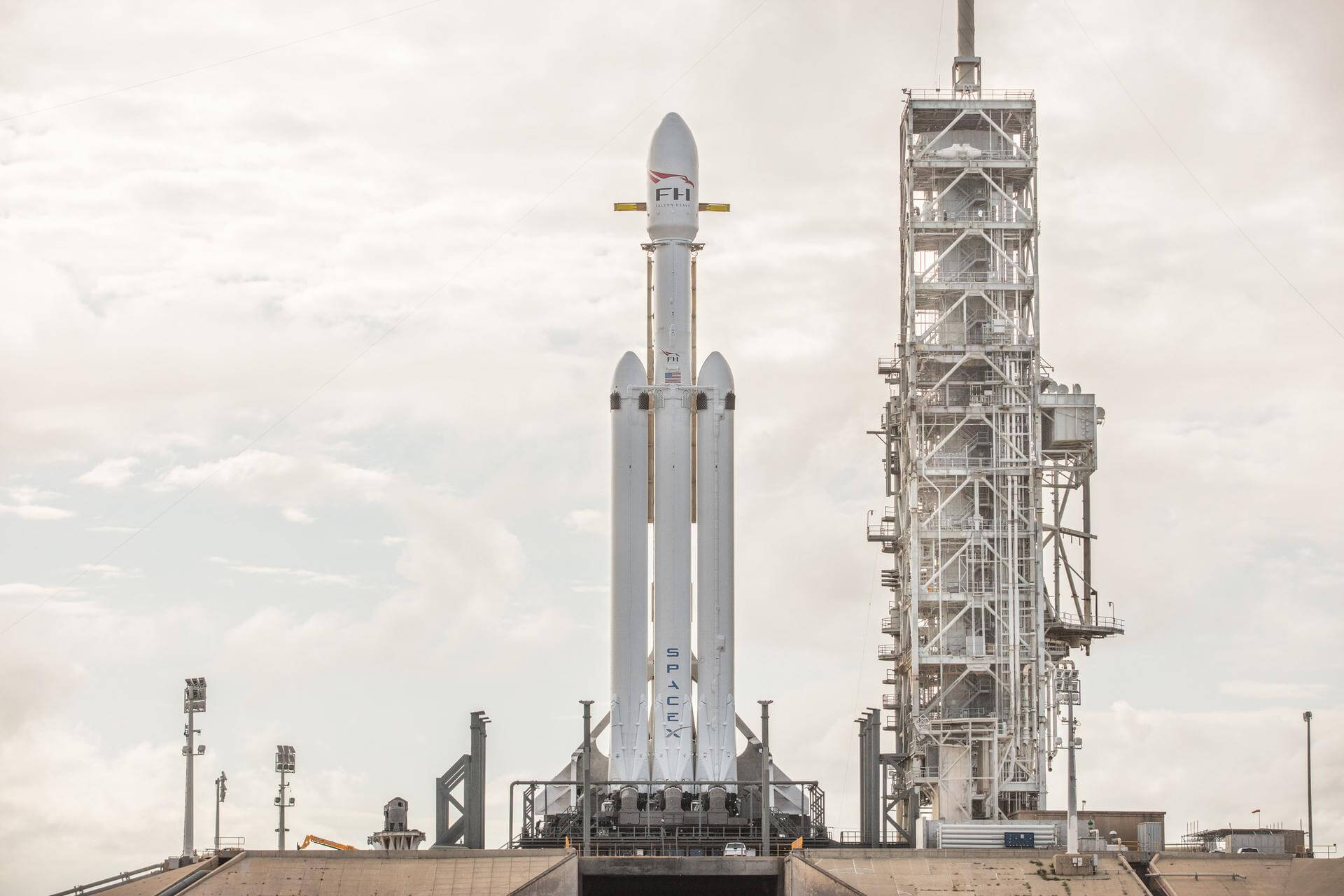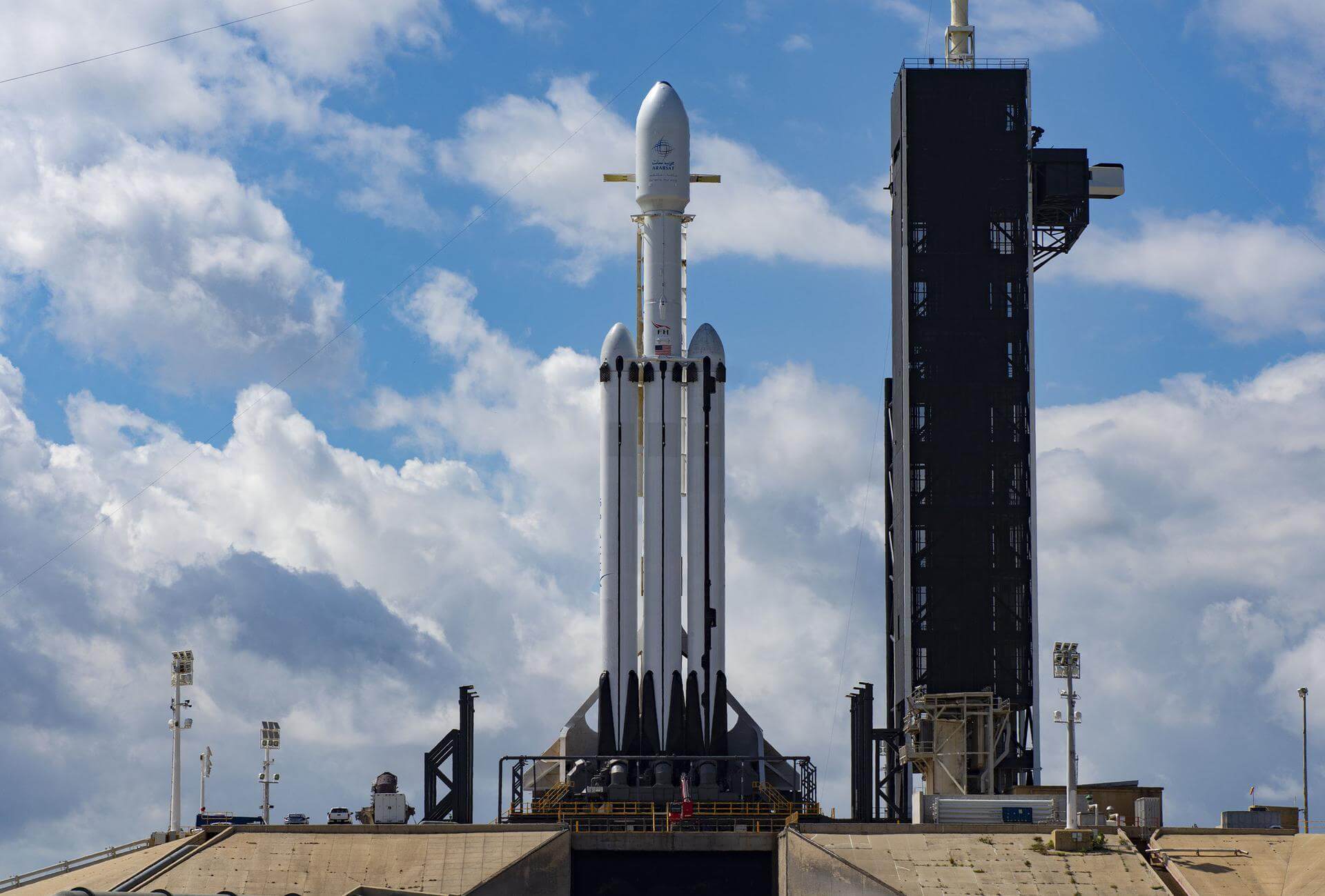
Falcon Heavy
Active Re-UsableSpaceX (SpX)
Feb. 6, 2018
Description
The Falcon Heavy is a variant of the Falcon 9 full thrust launch vehicle and consists of a standard Falcon 9 rocket core, with two additional boosters derived from the Falcon 9 first stage.
Specifications
-
Stages
3 -
Length
70.0 m -
Diameter
12.2 m -
Fairing Diameter
― -
Launch Mass
1400.0 T -
Thrust
22819.0 kN -
Apogee (Sub-Orbital)
200.0 km
Family
-
Name
Falcon Heavy -
Family
― -
Variant
Heavy -
Alias
― -
Full Name
Falcon Heavy
Payload Capacity
-
Launch Cost
$90000000 -
Low Earth Orbit
63800.0 kg -
Geostationary Transfer
Orbit
26700.0 kg -
Direct Geostationary
― -
Sun-Synchronous Capacity
―
SpaceX
Commercial
CEO: Elon Musk
SpX 2002Space Exploration Technologies Corp., known as SpaceX, is an American aerospace manufacturer and space transport services company headquartered in Hawthorne, California. It was founded in 2002 by entrepreneur Elon Musk with the goal of reducing space transportation costs and enabling the colonization of Mars. SpaceX operates from many pads, on the East Coast of the US they operate from SLC-40 at Cape Canaveral Space Force Station and historic LC-39A at Kennedy Space Center. They also operate from SLC-4E at Vandenberg Space Force Base, California, usually for polar launches. Another launch site is being developed at Boca Chica, Texas.
Upcoming Spaceflights
Falcon Heavy | ViaSat-3 F3 (ViaSat-3 Asia-Pacific)
SpaceX | United States of AmericaKennedy Space Center, FL, USA
TBD June, 2026
Status: To Be Determined
Mission:
The ViaSat-3 is a series of three Ka-band satellites is expected to provide vastly superior capabilities in terms of service speed and flexibility for a satellite platform. Each ViaSat-3 class satellite is expected to deliver more than 1-Terabit per second of network capacity, and to leverage high levels of flexibility to dynamically direct capacity to where customers are located.
Geostationary Transfer OrbitFalcon Heavy | Griffin Mission One
SpaceX | United States of AmericaKennedy Space Center, FL, USA
TBD July, 2026
Status: To Be Determined
Mission:
Demonstration flight of the Astrobotic Griffin lander and its engines, initially contracted for the cancelled NASA VIPER (Volatiles Investigating Polar Exploration Rover) mission. The vacated payload spot will now host the FLIP (FLEX Lunar Innovation Platform) lunar rover from Astrolab.
Lunar Orbit Unknown FH - Maiden Flight Unknown Unknown FH - Maiden Flight Unknown Unknown FH - Maiden Flight UnknownFalcon Heavy | Nancy Grace Roman Space Telescope
SpaceX | United States of AmericaKennedy Space Center, FL, USA
TBD September, 2026
Status: To Be Determined
Mission:
The Nancy Grace Roman Space Telescope is a NASA infrared space telescope with a 2.4 m (7.9 ft) wide field of view primary mirror and two scientific instruments. The Wide-Field Instrument (WFI) is a 300.8-megapixel multi-band visible and near-infrared camera, providing a sharpness of images comparable to that achieved by the Hubble Space Telescope over a 0.28 square degree field of view, 100 times larger than imaging cameras on the Hubble. The Coronagraphic Instrument (CGI) is a high-contrast, small field of view camera and spectrometer covering visible and near-infrared wavelengths using novel starlight-suppression technology. Roman objectives include a search for extra-solar planets using gravitational microlensing, and probing the expansion history of the Universe and the growth of cosmic structure, with the goal of measuring the effects of dark energy, the consistency of general relativity, and the curvature of spacetime.
Sun-Earth L2Falcon Heavy | USSF-70
SpaceX | United States of AmericaKennedy Space Center, FL, USA
TBD December, 2026
Falcon Heavy | Astrobotic-3
SpaceX | United States of AmericaKennedy Space Center, FL, USA
TBD December, 2026
Falcon Heavy | USSF-75
SpaceX | United States of AmericaKennedy Space Center, FL, USA
TBD December, 2026
Falcon Heavy | NROL-86
SpaceX | United States of AmericaKennedy Space Center, FL, USA
TBD June, 2027
Falcon Heavy | WGS-12 (USSF-206)
SpaceX | United States of AmericaKennedy Space Center, FL, USA
TBD June, 2027
Falcon Heavy | USSF-63
SpaceX | United States of AmericaKennedy Space Center, FL, USA
TBD June, 2027
Falcon Heavy | USSF-155
SpaceX | United States of AmericaKennedy Space Center, FL, USA
TBD June, 2027
Falcon Heavy | Gateway PPE & HALO
SpaceX | United States of AmericaKennedy Space Center, FL, USA
TBD December, 2027
Status: To Be Determined
Mission:
The Power and Propulsion Element (PPE) and Habitation and Logistics Outpost (HALO) are the foundational elements of NASA's lunar-orbiting space station "Gateway". The PPE is a 60-kilowatt class solar electric propulsion spacecraft that also will provide power, high-speed communications, attitude control and the capability to move the Gateway to different lunar orbits. The HALO is the pressurized living quarters where astronauts who visit the Gateway, often on their way to the Moon, will work. It will provide command and control and serve as the docking hub for the outpost. HALO will support science investigations, distribute power, provide communications for visiting vehicles and lunar surface expeditions, and supplement the life support systems aboard Orion, NASA’s spacecraft that will deliver Artemis astronauts to the Gateway.
Lunar OrbitFalcon Heavy | Dragonfly
SpaceX | United States of AmericaKennedy Space Center, FL, USA
TBD July, 2028
Status: To Be Determined
Mission:
Dragonfly is NASA's 4th New Frontiers program mission that will send a robotic rotorcraft to fly within the atmosphere of Saturn's moon Titan to sample materials and determine surface composition in different geologic settings, advancing humanity's search for the building blocks of life. The craft is a large quadcopter with double rotors with mass of about 875 kg, featuring rotors of 1.35 m in diameter. It can fly through several kilometers within an hour and will perform 1 flight per Titan day (~16 Earth days). During the planned 3.3-year mission, Dragonfly is expected to cover distance up to several hundred km. Dragonfly will use a Multi-Mission Radioisotope Thermoelectric Generator (MMRTG) to power its instruments. The planned science instrument suite is: * DragonCam: Camera Suite * DrACO: Drill for Acquisition of Complex Organics * DraMS: Mass Spectrometer * DraGNS: Gamma-ray and Neutron Spectrometer * DraGMet: Geophysics and Meteorology
Heliocentric N/AFalcon Heavy | NROL-97
SpaceX | United States of AmericaKennedy Space Center, FL, USA
TBD December, 2029
Falcon Heavy | USSF-174
SpaceX | United States of AmericaKennedy Space Center, FL, USA
TBD December, 2029
Falcon Heavy | USSF-186
SpaceX | United States of AmericaKennedy Space Center, FL, USA
TBD December, 2029
Falcon Heavy | Europa Clipper
SpaceX | United States of AmericaKennedy Space Center, FL, USA
Oct. 14, 2024, 4:06 p.m.
Status: Launch Successful
Mission:
Europa Clipper is the first dedicated mission to study Jupiter's moon Europa. Mission is developed by NASA and comprises of an orbiter spacecraft, which, while in orbit around Jupiter, will perform numerous flybys over Europa. Europa Clipper payload suit included high-resolution cameras and spectrometers for imaging Europa's surface and thin atmosphere, an ice-penetrating radar to search for subsurface water, and a magnetometer and gravity measurements to measure the moon's magnetic field and unlock clues about its ocean and deep interior.
Heliocentric N/A B1064 - Flight Proven ( ) Atlantic Ocean B1065 - Flight Proven ( ) Atlantic Ocean B1089 - Maiden Flight Atlantic OceanFalcon Heavy | GOES-U
SpaceX | United States of AmericaKennedy Space Center, FL, USA
June 25, 2024, 9:26 p.m.
Status: Launch Successful
Mission:
The Geostationary Operational Environmental Satellite-U (GOES-U) is the fourth of the next generation of geostationary weather satellites, known as the GOES-R series. The four satellites of the series provide advanced imaging with increased spatial resolution and faster coverage for more accurate forecasts, real-time mapping of lightning activity, and improved monitoring of solar activity. Once GOES-U reaches orbit, it will be renamed GOES-19.
Geostationary Transfer Orbit B1087 - Maiden Flight Atlantic Ocean B1072 - Maiden Flight Landing Zone 1 B1086 - Maiden Flight Landing Zone 2Falcon Heavy | OTV-7 (X-37B) (USSF-52)
SpaceX | United States of AmericaKennedy Space Center, FL, USA
Dec. 29, 2023, 1:07 a.m.
Status: Launch Successful
Mission:
It is the seventh flight of the X-37B program. United States Air Force Orbital Test Vehicle is built by Boeing. It's an uncrewed 5000 kg, 8.8 m-long reusable mini-spaceplane capable of autonomous re-entry and landing.
Elliptical Orbit B1064 - Flight Proven ( ) Landing Zone 1 B1065 - Flight Proven ( ) Landing Zone 2 B1084 - Maiden Flight Atlantic OceanFalcon Heavy | Psyche
SpaceX | United States of AmericaKennedy Space Center, FL, USA
Oct. 13, 2023, 2:19 p.m.
Status: Launch Successful
Mission:
Psyche is a NASA interplanetary mission to visit the main belt asteroid of the same name, 16 Psyche. Spacecraft will take 4 years and one Mars flyby to reach the asteroid, which is of particular interest due to being comprised mostly of iron and nickel. Psyche is theorized to be a remnant of an early planet's core, and may offer insights into how solar system formed and evolved. The mission is led by Arizona State University, with NASA JPL being responsible for mission management and operations.
Heliocentric N/A B1065 - Flight Proven ( ) Landing Zone 2 B1079 - Maiden Flight Atlantic Ocean B1064 - Flight Proven ( ) Landing Zone 1Falcon Heavy | EchoStar 24/Jupiter-3
SpaceX | United States of AmericaKennedy Space Center, FL, USA
July 29, 2023, 3:04 a.m.
Status: Launch Successful
Mission:
Geostationary communications satellite built by Maxar Technologies for EchoStar. With a capacity of 500 Gbps, its purpose is to relieve broadband capacity constraints in the Americas.
Geostationary Transfer Orbit B1065 - Flight Proven ( ) Landing Zone 2 B1074 - Maiden Flight Atlantic Ocean B1064 - Flight Proven ( ) Landing Zone 1Falcon Heavy | ViaSat-3 F1 (ViaSat-3 Americas) & others
SpaceX | United States of AmericaKennedy Space Center, FL, USA
May 1, 2023, 12:26 a.m.
Status: Launch Successful
Mission:
The ViaSat-3 is a series of three Ka-band satellites is expected to provide vastly superior capabilities in terms of service speed and flexibility for a satellite platform. Each ViaSat-3 class satellite is expected to deliver more than 1-Terabit per second of network capacity, and to leverage high levels of flexibility to dynamically direct capacity to where customers are located. Also onboard this mission is Astranis's first MicroGEO satellite and Gravity Space’s GS-1 satellite.
Geostationary Orbit B1068 - Maiden Flight Atlantic Ocean B1052 - Flight Proven ( ) Atlantic Ocean B1053 - Flight Proven ( ) Atlantic OceanFalcon Heavy | USSF-67
SpaceX | United States of AmericaKennedy Space Center, FL, USA
Jan. 15, 2023, 10:56 p.m.
Status: Launch Successful
Mission:
USSF-67 is a mission for the United States Space Force with two satellites, including the LDPE-3A rapid prototype platform hosting 5 USSF payloads.
Geostationary Orbit B1070 - Maiden Flight Atlantic Ocean B1065 - Flight Proven ( ) Landing Zone 1 B1064 - Flight Proven ( ) Landing Zone 2Falcon Heavy | USSF-44
SpaceX | United States of AmericaKennedy Space Center, FL, USA
Nov. 1, 2022, 1:41 p.m.
Status: Launch Successful
Mission:
Classified US Space Force carrying two payloads directly to geostationary orbit. One is called the Shepherd Demonstration, and the other is LDPE 2 spacecraft that carries three hosted payloads and three deployable sub-satellites. One of them is an experimental microsatellite called TETRA-1.
Geostationary Orbit B1066 - Maiden Flight Atlantic Ocean B1065 - Maiden Flight Landing Zone 2 B1064 - Maiden Flight Landing Zone 1Falcon Heavy | STP-2
SpaceX | United States of AmericaKennedy Space Center, FL, USA
June 25, 2019, 6:30 a.m.
Status: Launch Successful
Mission:
The STP-2 payload is composed of 25 small spacecraft. Included is COSMIC-2 constellation to provide radio occultation data, along with 8 cubesat nanosatellites. Other payloads include LightSail carried by the Prox-1 nanosatellite, Oculus-ASR nanosatellite, GPIM and the Deep Space Atomic Clock.
Low Earth Orbit #STP2 B1052 - Flight Proven ( ) Landing Zone 1 B1057 - Maiden Flight Of Course I Still Love You B1053 - Flight Proven ( ) Landing Zone 2Falcon Heavy | Arabsat-6A
SpaceX | United States of AmericaKennedy Space Center, FL, USA
April 11, 2019, 10:35 p.m.
Status: Launch Successful
Mission:
Arabsat-6A is a Saudi Arabian communications satellite to be positioned at 30.5°East orbital slot. Arabsat-6A was built by Lockheed Martin for Arabsat and will deliver TV, internet and mobile phone services to the Middle East, Africa and Europe.
Supersynchronous Transfer Orbit #ArabSat6A B1053 - Maiden Flight Landing Zone 2 B1052 - Maiden Flight Landing Zone 1 B1055 - Maiden Flight Of Course I Still Love YouFalcon Heavy | Demo (Test Flight)
SpaceX | United States of AmericaKennedy Space Center, FL, USA
Feb. 6, 2018, 8:45 p.m.
Status: Launch Successful
Mission:
This will be the inaugural flight of the Falcon Heavy. The test payload will be SpaceX CEO Elon Musk's midnight cherry Tesla Roadster playing Space Oddity. Destination: An elliptical, heliocentric orbit. Apoapsis: Around Mars' orbital distance.
Heliocentric N/A B1023 - Flight Proven ( ) Landing Zone 1 B1025 - Flight Proven ( ) Landing Zone 2 B1033 - Maiden Flight Of Course I Still Love YouFalcon 9
Starlink Group 17-26
Space Launch Complex 4E - Vandenberg SFB, CA, USAA batch of 25 satellites for the Starlink mega-constellation - SpaceX's project for space-based Internet communication system.
Falcon 9
Starlink Group 6-110
Space Launch Complex 40 - Cape Canaveral SFS, FL, USAA batch of 29 satellites for the Starlink mega-constellation - SpaceX's project for space-based Internet communication system.
Falcon 9
Starlink Group 6-104
Space Launch Complex 40 - Cape Canaveral SFS, FL, USAA batch of 28 satellites for the Starlink mega-constellation - SpaceX's project for space-based Internet communication system.
Falcon 9
Starlink Group 17-25
Space Launch Complex 4E - Vandenberg SFB, CA, USAA batch of 25 satellites for the Starlink mega-constellation - SpaceX's project for space-based Internet communication system.
Falcon 9
Starlink Group 10-36
Space Launch Complex 40 - Cape Canaveral SFS, FL, USAA batch of 29 satellites for the Starlink mega-constellation - SpaceX's project for space-based Internet communication system. First Starlink laun…
